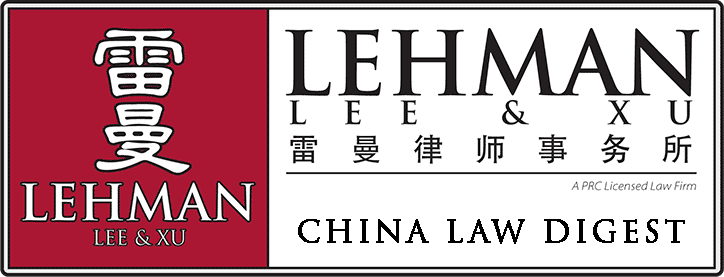The PRC State Council Information Office just published a White Paper on Judicial Reform in China. The purpose of the White Paper is to provide a snapshot view of the progress of legal reform in China over the past ten years. Readers who are interested in the current state of the Chinese legal system and the projection of future trends should take a look. Even for those who do not fully agree with the assessment will benefit by seeing what the top level of the Chinese government believes is important about China’s legal system and its future development.
Four issues raised in the White Paper are of particular interest to foreign investors in China:
1. The number of lawyers and lawsuits is rapidly increasing. This is contrary to what many foreign investors believe and the implications of this must be understood. The White Paper provides the following basic statistics:
There are currently 18,200 law firms in China, up 31.6% from 2000
There are 210,000 lawyers registered in China.
In 2011, Chinese lawyers acted as counselors for 392,000 clients, up 24.6% from 2008.
Chinese lawyers handled 2.315 million litigation cases in 2011, up 17.7% from 2008.
The White Paper does not mention that the number of judges in China has remained static at about 200,000 over this same period. This has meant an increasing workload for the judges and has negatively affected the quality of decisions. Nonetheless, Chinese people are still making active use of the court system to resolve disputes.
Most foreign business people are unaware of the large amount of litigation that occurs in China and tend to believe that they will never be sued. They therefore do not prepare for lawsuits and, when sued, they do not take the matter seriously and often do not respond promptly and effectively. This is a mistake. As the numbers above show, there are a lot of lawyers in China and they make their money suing people. When a dispute arises, the likelihood of being sued in China is actually quite high. Far higher for example than in Japan or in Korea.
2. China has made major progress in the administration of civil justice.
The improvements fall into four areas:
1) The functions of case filing, trial and execution have been clearly separated. The major change here is in the substantial improvements in executing on judgments. Though this may sound like a purely technical issue, it actually has important practical consequences for foreign companies doing business. Criticisms of the Chinese legal system often center on the difficulty in enforcing judgments. As a result of recent reforms, most Chinese courts have a created a department that focuses exclusively on enforcement. This has resulted in substantial improvement in the enforcement of monetary awards in most major jurisdictions. In addition, pre-judgment attachment of assets has become much more effective, adding a major tool for enforcing monetary awards. For foreign investors, this change cuts both ways. It has made litigation against Chinese companies more attractive since the Chinese company now has a real fear that any judgment will be enforced against it by seizure and sale of assets. On the other hand, it means that where the foreign party is a defendant, there is now a substantial risk that an adverse decision will have a strong negative impact. We are already seeing the impact of this in the willingness of Chinese companies to settle our clients' claims against them.
2) The application of the law has been clarified through legal guidance. China is a civil law system, meaning that decided cases are not binding. This lack of case law precedent is often cited as a weakness of the Chinese system, since the laws are written in a sketchy and often vague manner. The Chinese themselves have recognized that weakness and have filled the gap in two ways. First, the Supreme People’s Court regularly issues binding guidelines on the interpretation of important statutes. Second, the SPC and local high courts regularly publish authoritative cases with extensive commentary. These measures have been well received by Chinese lawyers and judges and have substantially improved clarity in the interpretation of Chinese laws. This too has led to Chinese companies focusing on settling claims so as to avoid being sued and losing.
3) Standardization in awards.
The Supreme Court has worked to achieve greater certainty and predictability in damage awards in civil cases. This removes much uncertainty in the litigation process and it also decreases opportunities for local judges to engage in bribery or other unacceptable practices.
4). Case management has been improved.
China’s major courts have installed modern case management systems. Many courts now use an on-line management system that allows parties to independently monitor the progress of a case. In many jurisdictions, streamlined case systems have been adopted that allow for quickly resolving simple matters and small claim matters. The result of all this is that Chinese lawsuits proceed to trial much faster than is common elsewhere in the world. This speed can take foreign parties very much by surprise. A Chinese lawsuit can be filed and tried in the time it takes merely to provide an answer in North American and European courts. From my experience, Chinese courts are not concerned about the thorough preparation of a case. They are more concerned that a case be heard quickly. The Chinese court motto seems to be “Justice delayed is justice denied.” Foreign investors need to take this into account. When service of a lawsuit is received, the defendant must respond immediately. There is no room for delay.
In part two, we will discuss the impact of China’s legal reforms on criminal cases.
Source: China law Blog
Link: http://www.chinalawblog.com/2012/10/judicial-reform-in-china-and-its-impact-on-foreign-investment.html

